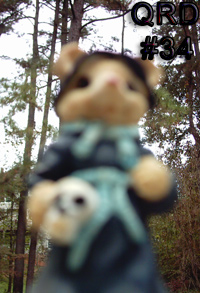
| about
this issue & the future
Attrition Interview Low Interview Electric Bird Noise Interview Halloween Movies by W. Dodson LK Halloween Craptacular Silber Sounds of Halloween |
 |
 |
 |
 |
 |
 |
 |
|
|
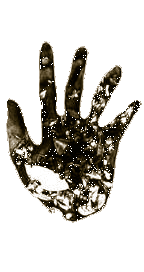

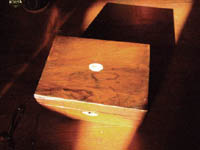
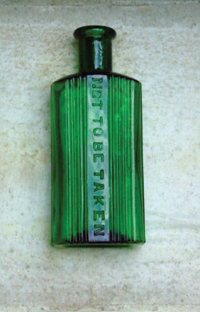
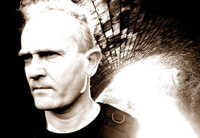






October 2, 2007
 |
The joke is that I interview Martin every other issue, but it's only the 6th interview. I guess I'll keep doing them until either I run out of questions or Martin runs out of answers. Attrition has been Martin’s musical outlet for over 25 years, remember when the only band together 25 years was the Rolling Stones? |
Martin – Something Stirs. Well I had a lot of old 4-track portastudio recordings hanging about for years... the first material we recorded in 82/83. A lot of it saw limited release on cassette compilations & the occasional piece of vinyl at the time. I liked enough of those songs, but really I didn’t think the recording quality was up to re-issuing them in the present day. But with being able to import them onto my PC & use new software to clean them up, I finally had them how I wanted them… 25 years later! & so I was pleased to put that album out.… I actually added 3 live tracks of unreleased material from 1981 when we had a real drummer.… I love that album... It means a lot to me.…
QRD – Do you see it as a main release or
more of something of interest to long
time fans?
Martin – I think the long-term fans will be the main people into Something Stirs, but to be honest I think the tracks still hold their own today. So there’s no reason that they can’t appeal. Although of course the album won’t be getting the same kind of promotion that an all-new one would.
QRD – I was pretty surprised that you don’t sing on it. You were mainly playing bass guitar. Why & when did you stop playing bass in Attrition?
Martin – I did some vocals at that time, but I decided that those tracks weren’t really up to being reissued. I did play bass as well at the very start of Attrition, but it was Julia’s bass & I really was a beginner. She went & traded it in for a fretless bass, which totally threw me at the time! So I bought a drum machine & a synthesizer. I never looked back... :)
QRD – How did you generally split up the 4 tracks? Did you do much bouncing down & layering or major pitch shifting & playing stuff backwards or any other 4-track tricks?
Martin – At the time when I recorded the early songs we experimented with lots of wild effects... all that, I loved it.… We tried to avoid bouncing down, as the quality was bad enough to begin with. We tended to record a few instruments at once onto stereo tracks & then overdub on the remaining two. We started with an old Teac 4-track with an awful built in mixer, then upgraded a couple of years later to a Tascam rackmount version & an outboard mixing board. It made a big difference & that’s what we recorded The Attrition of Reason & Realm of the Hungry Ghosts on.
QRD – At the time was Attrition your project with hired hands or more of an organic band?
Martin – At the beginning I always wanted it to be a shared socialist experience (I apologize to any Americans reading this :), but inevitably it didn’t work out like that & I ended up doing more & more & taking over when people left. I’ve never had hired hands though. Nowadays Attrition is centered on me, but I work regularly with some people & occasionally with others. It’s more flexible in that way, I prefer it now….
QRD – Another surprise is the live stuff having live drums. Did you move from live drums just because of the difficulty recording them in your early 4-track days?
Martin – No, we started with guitar, bass, vocals, & drums. I hadn’t even thought of synths.… But we soon got one & lost the guitarist (my brother Chris!), then the drummer went on holiday so we borrowed a drum machine for one show & as he started to lose interest I bought the first of a long line pf programmable drummers! It just happened.… It was all very weird to do this in 1981 & when we played live it didn’t always go down well.… It took some time for people to get comfortable with the new technology. We didn’t care... I still don’t... I’ll use anything to make a sound.
QRD – You have a sponsorship now where you were built a custom analog synth & they made the same synth for Trent Reznor. How did you get the sponsorship?
Martin – I was in contact Mike from Livewire Synthesizers in Los Angeles for years. He’d been into Attrition for a long time. We just started talking about it & he kindly designed a special synth made from his analogue modules. It’s great, a crazy synth. It lives in Minneapolis at the moment awaiting my return to the USA, but I hope to bring it back home before long.
QRD – On the song “Mercy Machine,” live you always have a lyrics sheet that you tear up into little pieces as the song is performed. What’s the story behind that?
Martin – Well that was weird how that happened. When we started doing “Mercy Machine” live I realized there was no way I was going to remember the lyrics on stage as every line began with CON (CONsume CONfess CONtrol CONdemn...etc...) so I printed them out... & as the song deals with CONtrol systems... state & religion... & making your own deal or CONtract... the idea of reading the words & ripping up the contract at the same time appealed. So there you go... I still can’t tell you the words without my paper...! :)
QRD – You used to have a lot of parallels musically with Die Form & often work together on remixes. How did your relationship start & what all did you do together?
Martin – I didn’t hear Die Form’s music for years until they got in touch with me in 1993 & asked if I would remix one of their songs (“Silent Order”). I’d never done a remix before so it was exciting. It came out pretty well. I did 3 mixes & one of them was used on their “best of” that Cleopatra put out a few years later.… That’s the only remix I did although after they heard my viola player Franck on our Etude album in 1997 I introduced them to him & he worked with them on their Duality album. (Franck is also French so he didn’t have far to travel to meet them!) We also played a show with them in Belgium in 1997. Since then we occasionally exchange albums or messages, but haven’t had too much to do with each other... perhaps it’s time.…
QRD – I guess it’s been a little while now that you’ve opted to start your own label for releasing your stuff. What do you think the biggest positives & negatives are to doing it all yourself?
Martin – Well it’s a year & a half now & it’s been crazy the amount of work I’ve had to do for it... (I’m sure you know Brian!). I’ve mainly been sorting out the re-mastering & artwork for a series of Attrition re-issues but there are new albums planned & possibly other artists I am looking at releasing.… It’s been a steep learning curve, but well worth it... it will pay off & when I get the massive re-issue schedule out of the way I will have some more time.… Sometimes I miss working with someone else on promotional activities etc. There are only so many hours in the day... but ultimately it’s good to be more in control.…
QRD – With all the changes in the music industry, what do you think a label would have to offer someone like you to put out a record rather than you doing it yourself?
Martin – It’s not the physical pressing & distribution thing... I can do that myself... a label would have to be seriously into promoting my music & put a lot of time & money into doing that... really, apart from financing, that’s the biggest job of a label... distribution will follow if the promotion is right.
QRD – If you had a lot of financial resources & were doing an arena style tour, what would you want for an Attrition live line-up? Would you have any pre-recorded material or try & make things 100% live or try to keep things as a three piece?
Martin – If I had the money I would expand the line up from the 2 vocals & synth player & backing. Although some of the pre-programmed synth parts would always have to be there - it is such a big part of Attrition - I don’t want to bring in a load of session players to attempt to convert that into live playing, but I would always have a violin player & an extra synth player & more artistic elements in film & dance…. But until then it works out pretty well I think.…
QRD – In the 1980’s you were quite prolific with the amount of stuff you put out on comps & EPs & albums. Would you say you have less material these days because of less time to work on it or because you are more discerning as to what is a good enough song to release?
Martin – Well, there are a number of reasons.... Less time - as I now run a label, book my own tours, teach music technology, & have 2 children! I also think that YES, I am more discerning.… I do take longer on tracks these days... working longer on arrangement & production & mastering - it seems to happen to everyone.… The desire to improve on what went before... although sometimes I think that gets in the way... it can spoil things.… Finally I think I spend longer on music as I don’t want to just repeat what I have done before... I know that doesn’t bother a lot of bands, but it bothers me. I am looking to find something new... I’m always doing that
QRD – I’ve heard that live music is getting a bit more popular again in the UK against DJ culture. Since the live Attrition is kind of a dance thing anyway, have you seen any effect one way or the other?
Martin – There is definitely more of a live scene again these days. Although more traditional too, in that I’m not seeing new music coming through... lots of punk & metal... not enough interesting challenging music. For what I do it is still hard to find outlets & that has mainly been in the festivals that are on here... although they are pretty popular so there is hope!
QRD – Since we’re talking a lot about the old days & I haven’t really ever seen too much about it in print, what’s the story about the fanzine you did before starting Attrition? I think you told me you got some financial support to do it from the British government at one point? Was it just xerox or newsprint? What was your biggest print run? Why did you stop doing it?
Martin – I did 18 issues of my fanzine “Alternative sounds” between 1979 – 1981. As you can see it overlapped with the start of Attrition & that was the reason I gave it up. I was getting so much more satisfaction from the band than I did the magazine. I did learn a lot from writing it though. It was a great time for music in the UK & I was pleased to be a part of it. We did quite well staring with 200 copies of issue 1 & getting up to 1000 copies in its prime! I used to write, edit other people’s contributions, do the layout, & then go out & sell it. There’s a piece on a UK TV program from 1980 called “Something Else” on me & the magazine. Wish I could find that now. I have some good memories from that era. I remember selling some copies to Boy George to sell on his market stall in Birmingham, before he got famous... & yes I got £100 grant to start it up from the Prince Charles trust for young people! Me & Julia met him later, the local press went mad... the prince & the Punks! Strange days.…
QRD – You use separate bands a bit depending on whether you’re touring in Europe or America, what’s the big advantage & disadvantage of having the different members?
Martin – As Attrition has a flexible line up I do have different synth players in Europe than I do in the USA. At the end of the day, they are interpreting the parts I wrote originally. It’s easier if I can call on different people & it keeps things varied too. I’ve had different singers as well over the years. Again it works, but it can be a lot of work for me finding the right people & practicing with them. I’m always open to ideas if anyone’s reading this! :)
QRD – So right now you are working on a new release about a female serial killer from the 1800’s? What’s the story on that? Is the music more toward your ambient side or your dancey side?
Martin – It is a totally dark ambient soundtrack album - it tells the story of Mary Ann Cotton – England’s greatest female serial killer. She was arrested in 1872 for the murder by arsenic poisoning of up to 21 of her own children & former husbands. Strange thing is that the arresting officer was an ancestor of mine! & his daughter Louisa worked as a seamstress for Mary Ann for a while. When they took her to jail, Mary Ann gave Louisa her sewing box as payment... it was handed down through my family... my father gave it to me a couple of years ago. So it inspired the album. It’s a surreal dream like journey. I’m really pleased with it. I have some special guests on it too. Emilie Autumn on vocals & violin, Ned Kirby on piano, Erica Mulkey (she played with Rasputina last year) on cello... & my kids sing the Victorian children’s rhyme about Mary Ann. I am talking with a Los Angeles producer about making this into a film at the moment.… You have a track from this album on your new Halloween compilation.… Which is the release date of All mine enemys whispers - the story of Mary Ann Cotton.
QRD – What’s the status on the Attrition tribute record you’re assembling?
Martin – It’s coming together well. I have about 75% of the tracks I need. So there is still time if anyone would like to cover something.... The more different to the original the better for me! It will be released next year!
QRD – Anything else we should know?
Martin – There’s always something else you should know.
Official
Attrition Website
Attrition
on MySpace
Other QRD interviews with
Martin:
Attrition
interview (april 1995)
Attrition
interview (october 2000)
Attrition
interview (july 2004)
Martin
Bowes Father's Day interview (may 2007)
I Heart FX
Martin
Bowes (Attrition) (1997)
